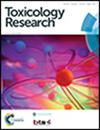Investigation of the toxicity and safety concerns of transgenic maize seeds expressing immunogenic F and HN protein genes against Newcastle disease virus.
IF 2.2
4区 医学
Q3 TOXICOLOGY
引用次数: 0
Abstract
Introduction The presented study investigated the potential toxicity and safety concerns associated with transgenic maize seeds expressing immunogenic F and HN protein genes against Newcastle disease virus (NDV). Methodology The experiment involved feeding Sprague-Dawley rats with transgenic maize seeds formulated into standard diets at levels of 30% (w/w) for a duration of 90 days. The rats were divided into three groups, with 10 rats per group. We assessed various parameters including overall appearance, feed consumption, body weight, organ weight, hematological parameters, serum chemistry, and histopathology. Results The results of these assessments were compared between the control group and the treatment groups. The study findings revealed that there were no significant differences between the control and treatment groups in terms of overall appearance, feed consumption, body weight, organ weight, hematological parameters, serum chemistry, microscopic histopathology, and gross appearance of tissues. These observations suggest that the consumption of transgenic maize seeds did not lead to any treatment-related adverse effects or toxicological issues. Furthermore, the transgenic maize seeds were found to be nutritionally equivalent to their non-transgenic counterpart. Conclusion Overall, no physiological, pathological, or molecular toxicity was observed in the Rats fed with transgenic feed.However, it is important to note that this study focused specifically on the parameters measured and the outcomes observed in Sprague-Dawley rats, and further research and studies are necessary to fully evaluate the safety and potential applications of transgenic edible vaccines in humans or other animals.调查表达抗新城疫病毒免疫原性 F 和 HN 蛋白基因的转基因玉米种子的毒性和安全问题。
引言 本研究调查了表达抗新城疫病毒(NDV)免疫原 F 和 HN 蛋白基因的转基因玉米种子的潜在毒性和安全问题。大鼠分为三组,每组 10 只。我们对各种参数进行了评估,包括整体外观、饲料消耗、体重、器官重量、血液学参数、血清化学和组织病理学。研究结果表明,对照组和处理组在整体外观、饲料消耗量、体重、器官重量、血液学参数、血清化学、显微组织病理学和组织大体外观方面没有显著差异。这些观察结果表明,食用转基因玉米种子不会导致任何与治疗相关的不良反应或毒理学问题。此外,还发现转基因玉米种子的营养成分与非转基因玉米种子相当。结论总体而言,用转基因饲料喂养的大鼠未发现生理、病理或分子毒性。不过,需要注意的是,本研究特别侧重于在 Sprague-Dawley 大鼠身上测量的参数和观察到的结果,要全面评估转基因食用疫苗在人类或其他动物身上的安全性和潜在应用,还需要开展进一步的研究。
本文章由计算机程序翻译,如有差异,请以英文原文为准。
求助全文
约1分钟内获得全文
求助全文
来源期刊

Toxicology Research
TOXICOLOGY-
CiteScore
3.60
自引率
0.00%
发文量
82
期刊介绍:
A multi-disciplinary journal covering the best research in both fundamental and applied aspects of toxicology
 求助内容:
求助内容: 应助结果提醒方式:
应助结果提醒方式:


